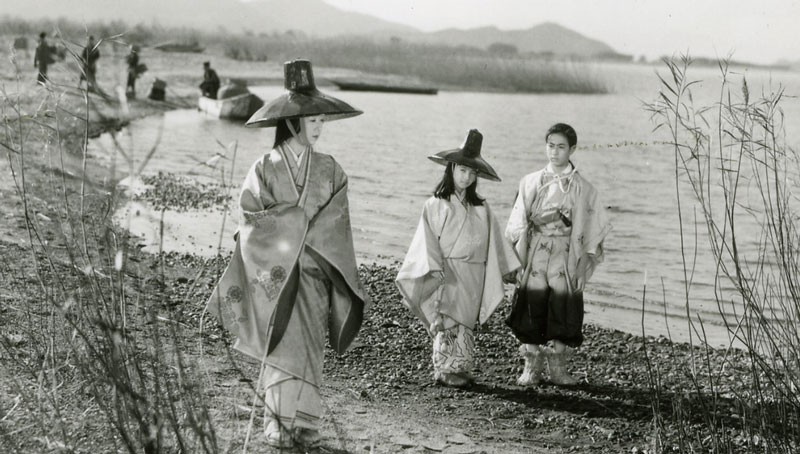
Image ©KADOKAWA CORPORATION 1954
Japan House London Film Season – Focus on Mizoguchi Kenji
- 18 February - 19 June 2024
- The Hall, Japan House London, 101-111 Kensington High Street, London, W8 5SA
- https://www.japanhouselondon.uk/series/japan-house-london-film-season-focus-on-mizoguchi-kenji/
- +44 (0)20 7932 7100
- info@japanhouselondon.uk
- Tweet
Mizoguchi Kenji (1898-1956), film programmer James Quandt declared, “is cinema’s Shakespeare, its Bach or Beethoven, its Rembrandt, Titian or Picasso.”
Like those canonical figures, he was both an accomplished stylist and a penetrating analyst of human experience. He was a master of the long take and the long shot, of the choreography of onscreen movement and the moving camera. He elicited superb performances from his actors and, above all, his actresses – most notably the great Tanaka Kinuyo, who featured in fifteen of his films between 1940 and 1954. His period films dramatized Japan’s tumultuous history and reflected on the ongoing relevance of the past to the present; his films with contemporary settings bore trenchant witness to the turmoil of the transformative era in which he lived.
When Mizoguchi Kenji passed away, still relatively young at 58, his younger contemporary Kurosawa Akira, giving the eulogy at his funeral, declared that “Japanese film has lost its truest creator.” Today, international audiences are more likely to come to the classical Japanese cinema through Kurosawa himself, or Ozu Yasujirō. But those who discover Mizoguchi’s films will be richly rewarded: he was among the greatest cinematic artists Japan, and indeed the world, has produced.
Mizoguchi’s directorial career spanned more than thirty years and he made more than eighty films – many of them sadly lost. For this Japan House London Film Season, Japanese film critic and scholar Alexander Jacoby has specially curated a selection of screenings, choosing to focus on Mizoguchi’s last years, when he realised many of his finest achievements.
The season begins with one of his most renowned works, The Life of Oharu (1952), a chronicle of the decline and fall of a courtly lady in the wake of a forbidden love affair based on a prose novel by poet and novelist Ihara Saikaku (1642-93). The focus then shifts to closely look at a fast-changing postwar Japan through The Lady from Musashino (1951) and Gion Festival Music (1953), and a tale of forbidden love struggling to survive in the face of persecution in A Story from Chikamatsu (1955). The series will then finish with the film described by most critics as one of Mizoguchi’s greatest achievements: Sanshō Dayū (1954), a powerful period drama set in medieval times but still powerfully relevant today.
To introduce the topics addressed in the film season, Japan House London is delighted to welcome Alexander Jacoby to give a talk and focus on Mizoguchi’s broader work in the 1950s, expanding on his depiction of female struggles in Japan’s society and his relationship with literature and theatre through the chosen titles for the series.
Season Programme
This page is updated with information on individual events as they become available to book.
30 January 2024: A Master of Human Experience: Talk on Mizoguchi Kenji by Alexander Jacoby
14 and 18 February 2024 – The Life of Oharu (bookings open on 5 February)
10 and 13 March 2024 – The Lady of Musashino (bookings open on 26 March)
14 and 17 April 2024 – Gion Festival Music (bookings open on 1 April)
12 and 22 May – A Story from Chikamatsu (bookings open on 29 April)
9 and 19 June 2024 – Sanshō Dayū (bookings open on 27 May)
The screenings are in Japanese with English subtitles. Guests who are booked to attend the screening can also enjoy 10% off drinks at The Stand on their way in.
This page has been produced in collaboration with Alexander Jacoby.
Booking essential | Admission free
